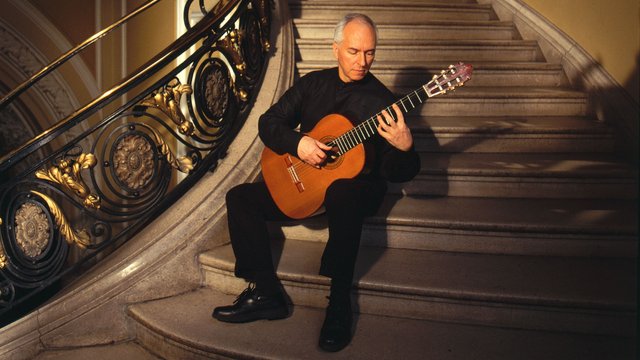John Williams, born on 24 April 1941 in Melbourne, Australia, is a classical guitarist renowned for his exceptional technique and musicality. His contributions to the classical guitar world are immense, spanning over several decades, and he is considered one of the most prominent classical guitarists of his generation.
Early Life and Musical Training
Williams’ father, Leonard Williams, was a guitarist himself and played a significant role in John’s early musical education. John began playing guitar at a very young age and showed remarkable talent. Recognizing his son’s potential, Leonard arranged for John to study with Andres Segovia, the most famous classical guitarist of the time. Williams’ time with Segovia was pivotal in shaping his approach to the instrument and the classical repertoire.
Career and Musical Achievements
John Williams’ career took off in the late 1950s and early 1960s. He performed in various prestigious venues and collaborated with numerous orchestras and conductors. His playing was characterized by a blend of technical precision and expressive musicality, which won him admirers around the world.
Williams expanded the classical guitar repertoire by commissioning works from contemporary composers and also by his own arrangements of music from various genres. His collaborations with other musicians, including guitarists, chamber ensembles, and orchestras, were also a hallmark of his career. He was particularly noted for his partnership with fellow guitarist Julian Bream, which significantly contributed to the popularity of guitar duets.
Recordings and Contributions to Music
John Williams has an extensive discography that includes both solo and collaborative works. His recordings cover a wide range of styles, from traditional classical pieces to modern compositions and cross-genre experiments. Notably, his album “The Seville Concert” is acclaimed for its exquisite performances of classical guitar repertoire.
In addition to his performing career, Williams has been a dedicated teacher and mentor to young guitarists. His masterclasses and instructional materials have influenced generations of guitarists.
Innovations and Instruments
Williams was known for his interest in guitar construction and acoustics. He collaborated with guitar makers to explore innovations in guitar design, seeking to enhance the instrument’s sound and playability.
Personal Life and Legacy
Throughout his life, Williams maintained a balance between his public career and personal interests. He is a private individual, and little is known about his personal life compared to his professional achievements.
John Williams’ legacy in the world of classical guitar is significant. He is regarded as a bridge between traditional and modern styles, and his influence is seen in the way classical guitar is taught and played today. His recordings continue to inspire both listeners and aspiring guitarists, cementing his status as a legend in the classical guitar world.
In conclusion, John Williams’ contributions to classical guitar are unparalleled. His mastery of the instrument, innovative approach to repertoire, and dedication to teaching have left an indelible mark on the music world. Williams’ legacy will undoubtedly continue to inspire future generations of guitarists and classical music enthusiasts.




